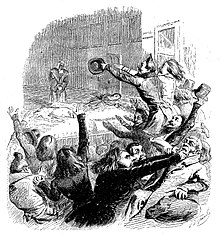
Back Hernani (Hugo) Catalan Hernani Czech Hernani (Drama) German Ερνάνης (θεατρικό έργο) Greek Hernani (Victor Hugo) Esperanto Hernani (obra de teatro) Spanish Hernani Estonian Hernani French Էռնանի (դրամա) Armenian Hernani (dramma) Italian
| Hernani ou l'Honneur Castillan | |
|---|---|
 The audience fights during the premiere | |
| Written by | Victor Hugo |
| Characters |
|
| Date premiered | 25 February 1830 |
| Place premiered | Paris |
| Original language | French |
| Subject | Courtly romance |
| Genre | Drama |
| Setting | Spanish court, 1519 |


Hernani (full title: Hernani, ou l'Honneur Castillan) is a drama in rhyming alexandrines by the French romantic author Victor Hugo.
The title originates from Hernani, a Spanish town in the Southern Basque Country, where Hugo's mother and her three children stopped on their way to General Hugo's place of residence.[1]
The play was given its premiere on 25 February 1830 by the Comédie-Française in Paris.[2] Today, it is more remembered for the demonstrations which accompanied the first performance and for being the inspiration for Giuseppe Verdi's opera Ernani than it is for its own merits. Hugo had enlisted the support of fellow Romanticists such as Hector Berlioz and Théophile Gautier[3] to combat the opposition of Classicists who recognised the play as a direct attack on their values.
Hernani is used to describe the magnitude and elegance of Prince Prospero's masquerade in Edgar Allan Poe's short story "The Masque of the Red Death". Gillenormand in Les Misérables criticizes Hernani.[4]
Verdi's opera Ernani, with an Italian libretto by Francesco Maria Piave, was based on the play, and first performed in Venice in 1844.
- ^ Escholier, Raymond, Victor Hugo raconté par ceux qui l'ont vu, Librairie Stock, 1931, p. 8.
- ^ Garreau 1984, p. 532.
- ^ Today in Literature: Hugo, Hernani, Hero
- ^ Victor Hugo: Les Misérables – From Page to Stage